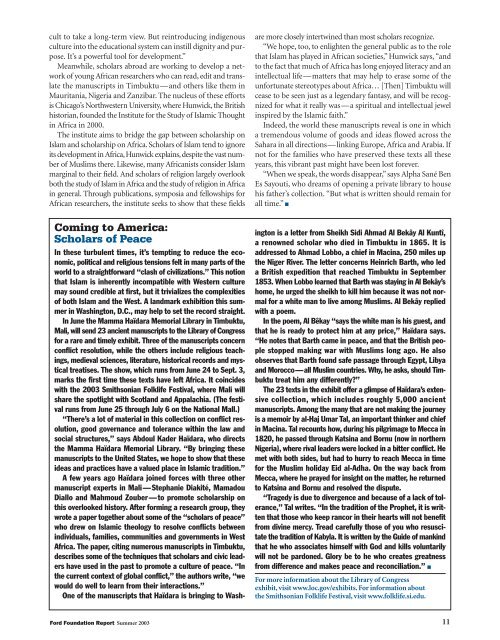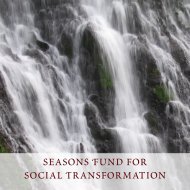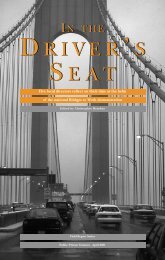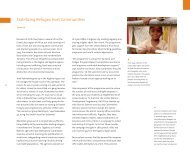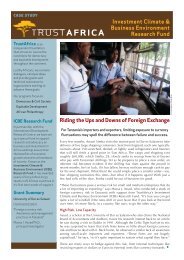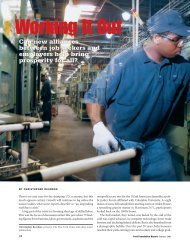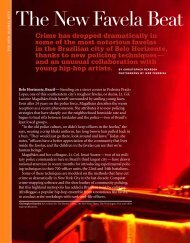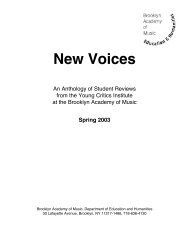Secrets of the Sahara - christopher reardon
Secrets of the Sahara - christopher reardon
Secrets of the Sahara - christopher reardon
Create successful ePaper yourself
Turn your PDF publications into a flip-book with our unique Google optimized e-Paper software.
cult to take a long-term view. But reintroducing indigenous<br />
culture into <strong>the</strong> educational system can instill dignity and purpose.<br />
It’s a powerful tool for development.”<br />
Meanwhile, scholars abroad are working to develop a network<br />
<strong>of</strong> young African researchers who can read, edit and translate<br />
<strong>the</strong> manuscripts in Timbuktu—and o<strong>the</strong>rs like <strong>the</strong>m in<br />
Mauritania, Nigeria and Zanzibar. The nucleus <strong>of</strong> <strong>the</strong>se efforts<br />
is Chicago’s Northwestern University, where Hunwick, <strong>the</strong> British<br />
historian, founded <strong>the</strong> Institute for <strong>the</strong> Study <strong>of</strong> Islamic Thought<br />
in Africa in 2000.<br />
The institute aims to bridge <strong>the</strong> gap between scholarship on<br />
Islam and scholarship on Africa. Scholars <strong>of</strong> Islam tend to ignore<br />
its development in Africa,Hunwick explains,despite <strong>the</strong> vast number<br />
<strong>of</strong> Muslims <strong>the</strong>re. Likewise, many Africanists consider Islam<br />
marginal to <strong>the</strong>ir field. And scholars <strong>of</strong> religion largely overlook<br />
both <strong>the</strong> study <strong>of</strong> Islam in Africa and <strong>the</strong> study <strong>of</strong> religion in Africa<br />
in general. Through publications, symposia and fellowships for<br />
African researchers, <strong>the</strong> institute seeks to show that <strong>the</strong>se fields<br />
are more closely intertwined than most scholars recognize.<br />
“We hope, too, to enlighten <strong>the</strong> general public as to <strong>the</strong> role<br />
that Islam has played in African societies,” Hunwick says, “and<br />
to <strong>the</strong> fact that much <strong>of</strong> Africa has long enjoyed literacy and an<br />
intellectual life—matters that may help to erase some <strong>of</strong> <strong>the</strong><br />
unfortunate stereotypes about Africa… [Then] Timbuktu will<br />
cease to be seen just as a legendary fantasy, and will be recognized<br />
for what it really was—a spiritual and intellectual jewel<br />
inspired by <strong>the</strong> Islamic faith.”<br />
Indeed, <strong>the</strong> world <strong>the</strong>se manuscripts reveal is one in which<br />
a tremendous volume <strong>of</strong> goods and ideas flowed across <strong>the</strong><br />
<strong>Sahara</strong> in all directions—linking Europe, Africa and Arabia. If<br />
not for <strong>the</strong> families who have preserved <strong>the</strong>se texts all <strong>the</strong>se<br />
years, this vibrant past might have been lost forever.<br />
“When we speak, <strong>the</strong> words disappear,” says Alpha Sané Ben<br />
Es Sayouti, who dreams <strong>of</strong> opening a private library to house<br />
his fa<strong>the</strong>r’s collection. “But what is written should remain for<br />
all time.” ■<br />
Coming to America:<br />
Scholars <strong>of</strong> Peace<br />
In <strong>the</strong>se turbulent times, it’s tempting to reduce <strong>the</strong> economic,<br />
political and religious tensions felt in many parts <strong>of</strong> <strong>the</strong><br />
world to a straightforward “clash <strong>of</strong> civilizations.” This notion<br />
that Islam is inherently incompatible with Western culture<br />
may sound credible at first, but it trivializes <strong>the</strong> complexities<br />
<strong>of</strong> both Islam and <strong>the</strong> West. A landmark exhibition this summer<br />
in Washington, D.C., may help to set <strong>the</strong> record straight.<br />
In June <strong>the</strong> Mamma Haïdara Memorial Library in Timbuktu,<br />
Mali, will send 23 ancient manuscripts to <strong>the</strong> Library <strong>of</strong> Congress<br />
for a rare and timely exhibit. Three <strong>of</strong> <strong>the</strong> manuscripts concern<br />
conflict resolution, while <strong>the</strong> o<strong>the</strong>rs include religious teachings,<br />
medieval sciences, literature, historical records and mystical<br />
treatises. The show, which runs from June 24 to Sept. 3,<br />
marks <strong>the</strong> first time <strong>the</strong>se texts have left Africa. It coincides<br />
with <strong>the</strong> 2003 Smithsonian Folklife Festival, where Mali will<br />
share <strong>the</strong> spotlight with Scotland and Appalachia. (The festival<br />
runs from June 25 through July 6 on <strong>the</strong> National Mall.)<br />
“There’s a lot <strong>of</strong> material in this collection on conflict resolution,<br />
good governance and tolerance within <strong>the</strong> law and<br />
social structures,” says Abdoul Kader Haïdara, who directs<br />
<strong>the</strong> Mamma Haïdara Memorial Library. “By bringing <strong>the</strong>se<br />
manuscripts to <strong>the</strong> United States, we hope to show that <strong>the</strong>se<br />
ideas and practices have a valued place in Islamic tradition.”<br />
A few years ago Haïdara joined forces with three o<strong>the</strong>r<br />
manuscript experts in Mali—Stephanie Diakité, Mamadou<br />
Diallo and Mahmoud Zouber—to promote scholarship on<br />
this overlooked history. After forming a research group, <strong>the</strong>y<br />
wrote a paper toge<strong>the</strong>r about some <strong>of</strong> <strong>the</strong> “scholars <strong>of</strong> peace”<br />
who drew on Islamic <strong>the</strong>ology to resolve conflicts between<br />
individuals, families, communities and governments in West<br />
Africa. The paper, citing numerous manuscripts in Timbuktu,<br />
describes some <strong>of</strong> <strong>the</strong> techniques that scholars and civic leaders<br />
have used in <strong>the</strong> past to promote a culture <strong>of</strong> peace. “In<br />
<strong>the</strong> current context <strong>of</strong> global conflict,” <strong>the</strong> authors write, “we<br />
would do well to learn from <strong>the</strong>ir interactions.”<br />
One <strong>of</strong> <strong>the</strong> manuscripts that Haïdara is bringing to Washington<br />
is a letter from Sheikh Sidi Ahmad Al Bekây Al Kuntî,<br />
a renowned scholar who died in Timbuktu in 1865. It is<br />
addressed to Ahmad Lobbo, a chief in Macina, 250 miles up<br />
<strong>the</strong> Niger River. The letter concerns Heinrich Barth, who led<br />
a British expedition that reached Timbuktu in September<br />
1853. When Lobbo learned that Barth was staying in Al Bekây’s<br />
home, he urged <strong>the</strong> sheikh to kill him because it was not normal<br />
for a white man to live among Muslims. Al Bekây replied<br />
with a poem.<br />
In <strong>the</strong> poem, Al Bêkay “says <strong>the</strong> white man is his guest, and<br />
that he is ready to protect him at any price,” Haïdara says.<br />
“He notes that Barth came in peace, and that <strong>the</strong> British people<br />
stopped making war with Muslims long ago. He also<br />
observes that Barth found safe passage through Egypt, Libya<br />
and Morocco—all Muslim countries. Why, he asks, should Timbuktu<br />
treat him any differently?”<br />
The 23 texts in <strong>the</strong> exhibit <strong>of</strong>fer a glimpse <strong>of</strong> Haïdara’s extensive<br />
collection, which includes roughly 5,000 ancient<br />
manuscripts. Among <strong>the</strong> many that are not making <strong>the</strong> journey<br />
is a memoir by al-Haj Umar Tal, an important thinker and chief<br />
in Macina. Tal recounts how, during his pilgrimage to Mecca in<br />
1820, he passed through Katsina and Bornu (now in nor<strong>the</strong>rn<br />
Nigeria), where rival leaders were locked in a bitter conflict. He<br />
met with both sides, but had to hurry to reach Mecca in time<br />
for <strong>the</strong> Muslim holiday Eid al-Adha. On <strong>the</strong> way back from<br />
Mecca, where he prayed for insight on <strong>the</strong> matter, he returned<br />
to Katsina and Bornu and resolved <strong>the</strong> dispute.<br />
“Tragedy is due to divergence and because <strong>of</strong> a lack <strong>of</strong> tolerance,”<br />
Tal writes. “In <strong>the</strong> tradition <strong>of</strong> <strong>the</strong> Prophet, it is written<br />
that those who keep rancor in <strong>the</strong>ir hearts will not benefit<br />
from divine mercy. Tread carefully those <strong>of</strong> you who resuscitate<br />
<strong>the</strong> tradition <strong>of</strong> Kabyla. It is written by <strong>the</strong> Guide <strong>of</strong> mankind<br />
that he who associates himself with God and kills voluntarily<br />
will not be pardoned. Glory be to he who creates greatness<br />
from difference and makes peace and reconciliation.” ■<br />
For more information about <strong>the</strong> Library <strong>of</strong> Congress<br />
exhibit, visit www.loc.gov/exhibits. For information about<br />
<strong>the</strong> Smithsonian Folklife Festival, visit www.folklife.si.edu.<br />
Ford Foundation Report Summer 2003 11


